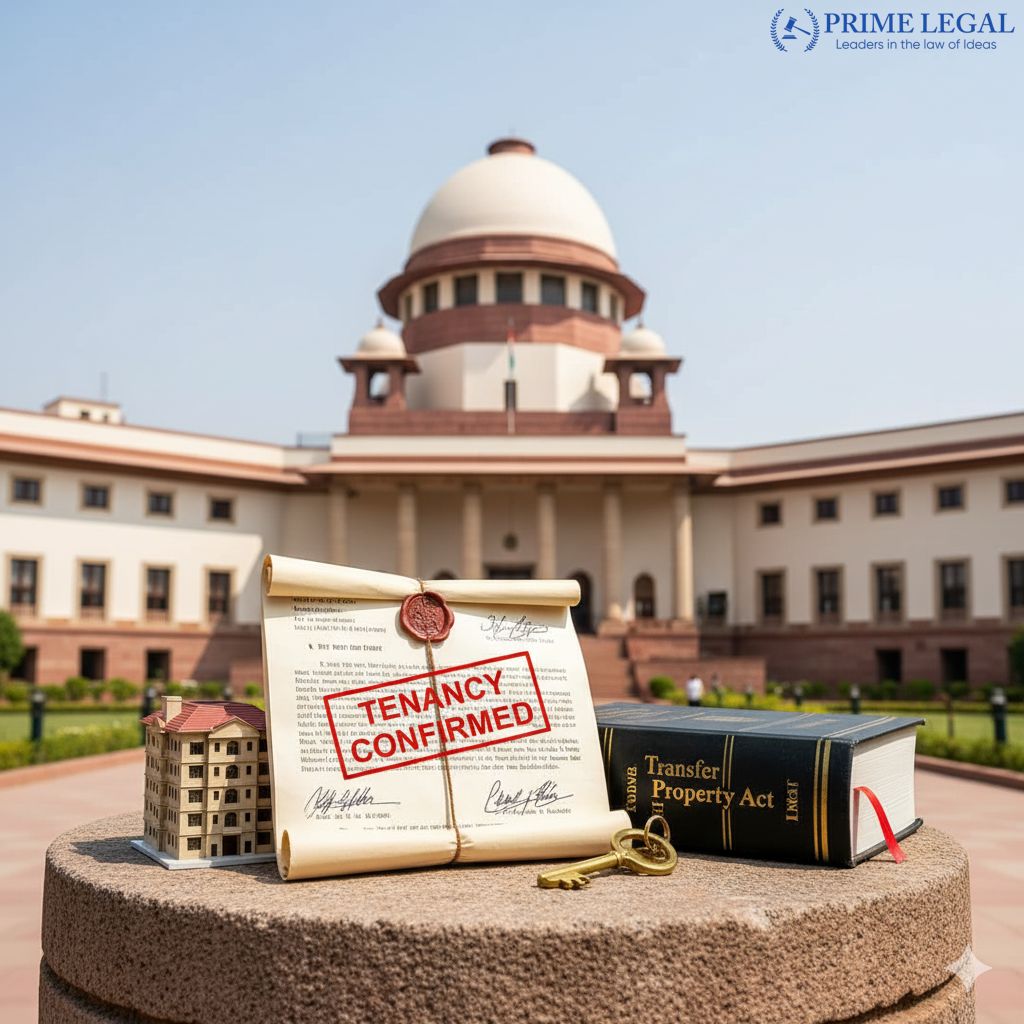INTRODUCTION
The Hon’ble Supreme Court of India has held that a tenant who entered into possession through a valid rent deed executed by a landlord cannot later challenge the ownership of the landlord. Deciding a seven decade old dispute dating back to 1953, the court featured that continuous payment of rent by the tenant and their successors over several decades bars them from later questioning the landlord’s ownership. This ruling came in Jyoti Sharma v. Vishnu Goyal & Anr. [2025 INSC 1099] decided on 11th Day of September, 2025 by the bench consisting of Justice J.K. Maheshwari and Justice K. Vinod Chandran.
BACKGROUND
The case arose from a well – established landlord – tenant relationship involving a small shop rented out by one Ramji Das (father – in law of the plaintiff, Jyoti Sharma) in 1953. After he deceased, his daughter – in – law Jyoti Sharma, claimed ownership of the property under a Will dated May 12, 1999, and sought eviction of the tenants for bona fides expansion of her family’s sweet and savouries business, but the tenant, descendants of the original tenant Kishan Lal, challenged the ownership of Ramji Das, claiming that the property actually belonged to his uncle, Sua Lal and therefore the Will of May 12, 1999 was fraud.
The Trial Court and the Appellant Court sided with the tenants, dismissing the landlord’s claim for lack of ownership proof and suspension over the Will.
KEY POINTS
- The Supreme Court reiterated that once the tenant takes possession under a rent deed executed by the landlord, cannot later dispute the landlord’s title of ownership. The Court relied on Exhibit P – 18, a relinquishment deed from Sua Lal in 1953 transferring ownership to Ramji, proving his ownership title.
- A probate order of 2018 validated Ramji’s Will was to confer legal sanctity upon Jyoti Sharma’s ownership, a binding decision which the lower Courts has strongly disregarded.
- The Court dismissed the suit, suspecting the Will on signature comparisons and finding no attornment and no proved landlord–tenant relationship post the testator’s death.
- The plaintiff’s desire to expand her sweets and savouries business into the tenanted premises was found to be bona fide. And hence the court criticised the Trial, Appellant and High Court findings as contrary to material evidence.
- Therefore the Supreme Court decreed eviction and directed payment of rent arrears from January 2000 until possession is delivered, granting the tenants six months to vacate upon filing an undertaking.
RECENT DEVELOPMENTS
The Supreme Court’s decision reverses concurrent findings of all three lower Courts and brings solution to the dispute that has lasted over a period of 70 years. The ruling reaffirms the legal principle that a tenant who has been recognised and paid rent to the landlord for decades cannot subsequently question the landlord’s ownership.
In recent judgments like H.S. Puttashankara v. Yashodamma [2025 INSC 1087] the Supreme Court order reinforcing that rent receipts signed by the landlord can suffice to establish the landlord-tenant relationship.
Another decision made in 2025 of the Punjab & Haryana High Court upholding a landlord’s right to evict when the premises are needed for a company controlled by the landlord’s family. As stated by Justice Deepak Gupta “While tenant’s protection is important, extending it indefinitely-to the extent that a landlord can never recover possession, no matter how pressing his need-would result in gross unfairness. It would virtually deprive the landlord of his ownership rights. Statutory protection can be used by the tenant as a shield, not as a sword.”
CONCLUSION
By setting aside the Lower Court’s findings, the Supreme Court reinforced the legal sanctity of long – standing tenant – landlord relationships. The judgment not only restores the landlord’s rights but also clarifies that tenants cannot misuse ownership disputes to resist eviction when rent deeds and title documents are well-established.
“PRIME LEGAL is a full-service law firm that has won a National Award and has more than 20 years of experience in an array of sectors and practice areas. Prime legal falls into the category of best law firm, best lawyer, best family lawyer, best divorce lawyer, best divorce law firm, best criminal lawyer, best criminal law firm, best consumer lawyer, best civil lawyer.”
WRITTEN BY- SUSMITA ROYCHOWDHURY


